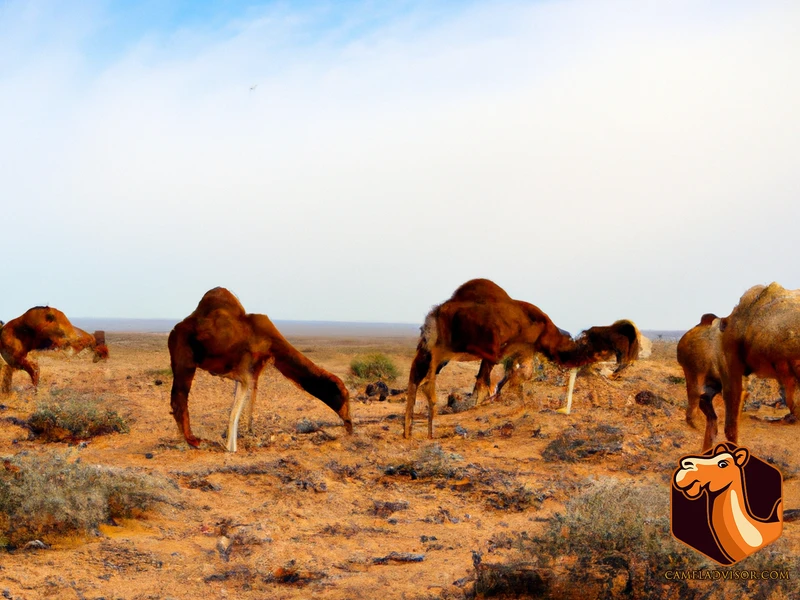Camels are fascinating creatures that have been domesticated for thousands of years. However, there are still many aspects of their care and feeding that have not been fully understood. One of the questions that has puzzled experts and camel owners alike is whether or not feeding camels salt is beneficial or detrimental. While some argue that salt is necessary for their health and well-being, others warn of the potential risks and drawbacks. In this article, we will explore the pros and cons of feeding camels salt, giving you a better understanding of this intriguing topic.
Contents
Camel’s Diet and Salt
Camels are known for their ability to go long periods without water, but their diet still plays a crucial role in their overall health and well-being. One aspect of their diet that is often overlooked is their salt intake. Salt, or sodium chloride, is an essential nutrient for all animals, including camels. It helps regulate fluid balance, nerve function, and muscle contractions. However, as with any nutrient, there are certain benefits and drawbacks to feeding camels salt.
Benefits of Feeding Camels Salt
Although camels are capable of surviving without salt, adding it to their diet can provide several benefits. One of the main benefits is the prevention of dehydration. Camels lose a significant amount of water through urine and feces, which can lead to dehydration if they are not receiving adequate amounts of salt. Salt helps stimulate thirst, which encourages camels to drink more water.
Another benefit of feeding camels salt is that it promotes overall health and well-being. Salt is essential for maintaining proper electrolyte balance in the body. Electrolytes are minerals that help regulate cellular function and maintain fluid balance. Without enough electrolytes, camels may experience muscle cramps, weakness, and fatigue.
Feeding camels salt can also lead to better performance. This is particularly important for working camels, such as those used in transportation or agriculture. Salt helps regulate muscle contractions, which can improve a camel’s strength and endurance. Salt can improve a camel’s digestion by stimulating the production of digestive enzymes.
Finally, feeding camels salt can increase milk yield in female camels. Salt helps stimulate milk production and enhance the quality of milk. This is particularly important for camels used for dairy purposes.
Drawbacks of Feeding Camels Salt
While there are several benefits to feeding camels salt, there are also some drawbacks to consider. One concern is that overconsumption of salt can lead to health problems. Camels that consume too much salt may experience diarrhea, dehydration, and electrolyte imbalances. Excess salt intake can increase the risk of certain health conditions, such as kidney disease and hypertension.
Feeding camels salt can also have environmental and economic impacts. Salt can contaminate water sources if it is not properly managed. Salt can be expensive, particularly if it is not readily available in the local area.
How Much Salt Should Camels Get?
Determining the appropriate amount of salt to feed camels can be tricky, as it depends on a variety of factors. These include the camel’s age, weight, activity level, and overall health. It is also important to consider the other nutrients in a camel’s diet, such as protein, fiber, and vitamins.
In general, camels require about 10-15 grams of salt per day for proper health and performance. However, this can vary depending on the specific camel and its needs. It is best to consult with a veterinarian or animal nutritionist to determine the appropriate amount of salt to feed a camel.
There are several ways to give salt to camels, including adding it to their feed or providing a salt lick. It is important to monitor the camel’s salt intake and adjust as necessary to prevent overconsumption.
Feeding camels salt can provide several benefits, including preventing dehydration, promoting health and well-being, and improving performance. However, there are also drawbacks to consider, such as overconsumption and environmental impacts. It is important to determine the appropriate amount of salt to feed camels based on their individual needs and to monitor their intake to ensure they are receiving adequate but not excessive amounts of this essential nutrient.
Benefits of Feeding Camels Salt

Feeding camels with salt can bring numerous benefits to their wellbeing. Here are some of the advantages of adding salt to a camel’s diet:
Prevention of dehydration: Camels are known for their ability to survive in hot and arid environments with little water. However, they still need to maintain a certain level of hydration to stay healthy. Salt helps regulate the water balance in a camel’s body, allowing them to retain water for longer periods and preventing dehydration.
Promotes health and well-being: Salt is a vital nutrient for camels as it contains essential minerals such as sodium and chloride. These minerals support the camel’s body functions, such as maintaining a healthy nervous system and regulating blood pressure.
Better performance: Adding salt to a camel’s diet can enhance their performance, especially when engaging in strenuous activities. Salt helps replace the minerals and fluids that are lost through sweating, allowing the camel to continue performing at optimal levels.
Increasing milk yield: For lactating camels, adding salt to their diet can increase milk production. The minerals found in salt support the camel’s body functions, including milk production.
Despite the apparent benefits of feeding camels salt, there are also some drawbacks that need to be considered.
Prevention of Dehydration
One of the benefits of feeding camels salt is its ability to help prevent dehydration. Camels are naturally adapted to living in hot and dry environments, and as a result, they have a unique relationship with water. They can go for long periods without water, but when they do drink, they consume large quantities in a short amount of time. This can be stressful on their bodies and cause dehydration, which can lead to serious health issues. However, when given proper amounts of salt, camels are better equipped to regulate their water intake and prevent dehydration. This is especially important for camels that are used for work or production, such as in the case of feeding camels during pregnancy and lactation, or in proper feeding practices for working camels.
Promotes Health and Well-being
When provided in appropriate quantities, salt can actually promote the health and well-being of camels. Salt helps regulate various body functions and maintain correct fluid balance within the body. Camels require various minerals and provide additional minerals such as calcium, phosphorus, and magnesium.
According to studies, providing salt to camels helps prevent mineral and electrolyte imbalance that can cause various health problems. Salt also helps the camel maintain a healthy weight and prevent dehydration.
In a study published in the Journal of Camel Practice and Research, researchers found that salt helped in maintaining the digestive health of camels. Proper digestion ensures proper absorption of all necessary nutrients, allowing the camel to maintain its health and well-being.
With a balanced diet and intake of adequate amounts of salt, camels will have a better overall performance, staying healthy and active.
It is important to note that overconsumption of salt can lead to health problems such as reduced appetite and dehydration, so responsible feeding practices should be followed. Camel owners and caretakers should be aware of the drawbacks of feeding too much salt and ensure the appropriate daily intake.
To ensure optimal health and well-being, camels require a balanced diet that includes adequate amounts of protein, fiber, water, and vitamins. Educating camel owners and caretakers on the nutritional requirements of camels helps to prevent and manage any potential health issues.
| Minerals provided by salt: | Calcium | Phosphorus | Magnesium |
|---|---|---|---|
| Benefits of salt: | Regulates body functions | Maintains fluid balance | Prevents dehydration and mineral imbalance |
| Drawbacks of overconsumption: | Reduced appetite | Dehydration | Health problems |
| Nutritional requirements for optimal health: | Calcium and Phosphorus for Bone Health | Adequate Protein Intake | Balanced Diet |
| Fiber for Digestion | Adequate Water Intake | Adequate Vitamins Intake |
Better Performance
Feeding camels with salt can also lead to better performance. As we know, athletes need salt to perform better during exercise, and this is no different for camels. Salt helps in restoring and maintaining electrolyte balance, which can help camels perform better in difficult conditions.
Improved Endurance: Providing camels with sufficient salt can help improve their endurance, especially during long journeys in hot and dry climates. This is because salt helps regulate their fluid balance, which in turn, can reduce fatigue and increase their overall stamina.
Enhanced Muscle Function: Salt plays a vital role in regulating muscle function. It aids in muscle contraction and relaxation, which is essential for camels during strenuous activities such as racing, transportation, and heavy farming work.
Increased Appetite: Proper salt intake can also increase the appetite of camels, leading to improved feeding behaviors and overall health.
However, it is essential to note that overfeeding camels with salt can have negative effects such as an increase in water intake, which can lead to dehydration, and other health problems. Moderation is key when it comes to the amount of salt given to camels.
Internal link: Effects of Overfeeding Camels
Increasing Milk Yield
Feeding camels with salt can lead to an increase in their milk yield. Salt acts as a stimulant and increases the secretion of hormones that produce milk. It helps the animal retain more water, which is essential for milk production.
According to research, feeding camels with salt can increase milk yield by up to 20%. However, it is important to note that excessive consumption of salt can lead to overhydration and other adverse health effects.
To balance the benefits and drawbacks of salt intake on milk yield, it is important to regulate the amount of salt given to the camel, as well as to monitor their overall diet and health.
The table below shows a summary of the benefits and drawbacks of feeding camels salt for increasing milk yield:
| Benefits | Drawbacks |
|---|---|
| Increases milk yield by up to 20% | May lead to overhydration and other adverse health effects |
| Acts as a stimulant and increases the secretion of hormones that produce milk | Excessive consumption of salt can lead to other health issues like dehydration, high blood pressure and kidney problems |
| Helps the animal retain more water | Excessive salt intake can affect the taste and quality of the milk |
It is important to balance the benefits and drawbacks of salt intake for camels to ensure the animal’s overall health and well-being. Regular monitoring and control of salt intake is the key to preventing adverse effects such as overhydration and health issues. If not treated, these issues can have long-term effects on the animal’s health and milk production.
Drawbacks of Feeding Camels Salt
Feeding salt to camels may have some drawbacks that must be taken into account. While salt has many benefits, excessive consumption can cause some adverse effects on a camel’s health, the environment, and the economy.
May Lead to Overconsumption: Overeating salt can be harmful to camels as it may cause dehydration, digestive problems, and other health issues. Camels have a natural thirst that ensures they drink enough water to stay hydrated. However, when given excessive salt, they may drink more water than they need, leading to an imbalance in their fluids and electrolytes. This can cause the camel to become ill, weak and may need veterinary attention.
Increase Risk of Health Problems: Just like humans, camels can suffer from hypertension due to excessive salt consumption. This condition can cause severe health problems such as mineral imbalances, abnormal heart rhythms, and cardiovascular disease. Overfeeding camel with salt can also negatively affect their reproductive and growth rate, leading to decreased milk production, weight loss, and slower growth.
Environmental Impact: The production of salt for livestock feed is environmentally damaging, as it generates waste and pollutants that can contaminate natural habitats and water sources. Overfeeding camels with salt can lead to manure having increased salt level which subsequently, can harm vegetation and soil quality, threatening natural animal habitats.
Economic Impact: Despite the many benefits of feeding salt to camels, it does come at a cost. Commercial salt suppliers may increase their prices due to supply and demand, inflation which affect the livestock industry. This ultimately affects camel owners and farmers who depend on camel production for income. A sudden surge in the price of salt could mean an increase in the cost of camel products or even a reduction in camel production.
While feeding camels with salt has its benefits, the drawbacks must be considered. It is crucial to ensure that camels consume salt in moderation to avoid any adverse effects on their health and the environment. It’s important to follow the recommended salt intake guidelines and adopt sustainable practices to avoid any negative outcomes on the camel’s health and the environment.
May Lead to Overconsumption
While feeding camels salt offers several benefits, it is important to be cautious about overconsumption. Overfeeding camels salt can lead to detrimental effects on their health and well-being. It is crucial to strike a balance between providing enough salt for their dietary needs and avoiding overconsumption. Otherwise, the excess salt in their diet can cause significant damage to their health. To learn more about the effects of overfeeding camels, check out this informative article on the effects of overfeeding camels.
Increase Risk of Health Problems
When it comes to feeding camels salt, there are some potential drawbacks to consider, particularly in terms of their health. While salt is necessary for a camel’s diet, overconsumption or improper intake can lead to health issues such as the ones listed below.
| Health Problems | Description |
|---|---|
| Dehydration | If camels consume too much salt, they may become more thirsty and drink more water, which can lead to dehydration. |
| Cardiovascular Issues | Excessive salt intake can lead to high blood pressure, which can cause cardiovascular problems in camels. |
| Urinary Issues | Too much salt can irritate the urinary tract in camels, leading to UTIs and other issues. |
| Joint Issues | Excess salt intake can lead to joint problems in camels, such as arthritis or inflammation. |
| Reduced Appetite | If camels consume too much salt, they may experience a decrease in appetite, which can impact their overall health and well-being. |
It’s important to note that these health risks are typically associated with overconsumption or improper salt intake, and not with the recommended amount of salt for a camel’s diet. If properly regulated, salt can provide a range of benefits for camels. However, it’s essential to monitor their salt intake and ensure they’re not consuming too much or too little.
Environmental Impact
The environmental impact of feeding camels salt is a topic that needs to be considered alongside the benefits and drawbacks of this practice. Here are some of the environmental impacts of feeding salt to camels:
- Soil Salinization: Overuse of salt can lead to increased levels of salt in the soil, which can hinder plant growth and reduce soil fertility. This can affect the entire ecosystem in the long run.
- Reduced Biodiversity: High levels of salt in the soil can also lead to a reduction in the variety of plant species that can grow. This can affect the food sources and habitats of other animals in the ecosystem.
- Water Pollution: Excess salt can end up in water sources such as rivers and lakes, causing water pollution. This can make water sources unsuitable for animals and even humans to use.
- Increased Soil Erosion: Overuse of salt can also lead to soil erosion, as the increased salt levels can reduce the ability of the soil to retain moisture. This can lead to the loss of topsoil and the degradation of the overall ecosystem.
It is important to consider these environmental impacts when deciding on the amount of salt to give to camels. While salt can provide benefits to the camels, overuse can have negative ecological effects. It’s important to strike a balance between the needs of the camels and the needs of the environment.
Economic Impact
The benefits and drawbacks of feeding camels salt not only have a significant impact on their health, but also on the economy. Below are the economic impacts of feeding salt to camels:
- Increased cost: Feeding camels salt increases the cost of their upkeep. Salt must be purchased and regularly replenished as it is consumed. Depending on the size of the herd, this additional cost can quickly add up.
- Decreased profitability: For camel herders who rely on these animals for their livelihoods, the added expense of feeding salt can decrease profitability. This is especially true for farmers in developing countries, where resources are often limited.
- Market fluctuations: Salt is a commodity that is subject to market fluctuations. If the price of salt increases, camel herders will have to pay more to continue feeding their herds. This can be especially challenging during times of drought or other environmental factors that impact salt supplies.
- Competitive advantage: Providing salt to camels can give a competitive advantage to farmers who invest in their animals’ health and well-being. Camels that are healthier and produce more milk or perform better in working conditions can be sold for a higher price in the market.
- Alternative feed: Some camel herders opt to feed their animals alternative feeds that provide the necessary minerals and nutrients, including salt. This can be a cost-effective solution that reduces the economic impact of feeding salt specifically.
While feeding camels salt can have economic drawbacks, it can also provide a competitive advantage and increase profitability for some herders. It is important to weigh the costs and benefits carefully and determine the best approach for each individual case.
How Much Salt Should Camels Get?
The amount of salt that camels should consume in their diet is an important consideration for their health and well-being. Several factors must be taken into account to determine the appropriate salt intake for camels.
Factors to Consider:
The age, weight, and overall health of the camel are factors that can influence their salt requirements. Additionally, the level of activity or work they perform also plays a role in the recommended salt intake. For example, lactating camels require more salt than non-lactating ones.
Recommended Salt Intake:
The recommended amount of salt for camels is 0.5-1.5% of their body weight. This means that a 500-kilogram camel should consume between 2.5 and 7.5 kilograms of salt per day. A high salt intake is usually required in hot climates where the risk of dehydration is high.
Ways to Give Salt to Camels:
There are several ways to provide salt to camels, some of which include:
– Loose Salt: This involves placing salt in a container or trough for the camel to self-regulate their intake.
– Salt Blocks: These are blocks of salt that the camel can lick as and when they need additional electrolytes.
– Mixed into Feed: Salt can be mixed into camel feed to ensure they receive an appropriate amount each day.
The method chosen will depend upon several factors, including the camel’s preferences and management practices.
Ensuring that camels get an appropriate amount of salt is imperative for their overall health and well-being. Careful attention must be given to the factors that determine their salt requirements, which include age, weight, activity level, and overall health. When provided in the right amount, salt can help camels thrive in their environment.
Factors to Consider
Before determining the amount of salt to give camels, there are several factors that need to be taken into consideration. It is important to understand that camels have different salt requirements depending on their age, size, and activity level. Additionally, environmental factors such as temperature and humidity can also impact their salt needs. To ensure the optimal health and well-being of camels, it is essential to assess all relevant factors before determining the appropriate salt intake.
Recommended Salt Intake
Camels, like most animals, require salt in their diet to maintain body functions, such as fluid balance, nerve function, and muscle contraction. However, it is essential to provide camels with the right amount of salt, as excessive intake can lead to health problems.
According to experts, the recommended salt intake for camels varies depending on several factors, such as age, weight, and activity level. Generally, adult camels weighing around 600 kg should consume anywhere between 10 and 20 grams of salt per day.
Young camels and lactating females may require more salt intake than adult males. On the other hand, it is crucial to limit salt intake for camels with health issues like kidney problems, as excessive salt intake can worsen their condition.
To ensure that camels receive the recommended daily salt intake, it is advisable to provide them with a free-choice salt block placed in an accessible location. This allows the camel to regulate its own salt intake based on their needs.
Providing a salt block with a adequate size is also essential. The size of the salt block should be appropriate for the camel’s size to ensure that the animal can consume an appropriate amount of salt as needed.
It is also essential to monitor the camel’s salt intake regularly. If there are any signs of excessive salt intake, such as excessive thirst, loss of appetite, or diarrhea, it is necessary to reduce the amount of salt given to the camel.
It is crucial to provide camels with a sufficient amount of salt to promote their health and well-being. However, it is equally important to monitor their intake to prevent excessive consumption, which may lead to health problems.
| Camel’s Weight | Recommended Daily Salt Intake |
| Less than 350 kg | 5-10 grams |
| 350 kg to 600 kg | 10-20 grams |
| More than 600 kg | 20-30 grams |
Ways to Give Salt to Camels
One effective way to give salt to camels is by providing them with salt blocks. These are large blocks of salt that are designed to be licked by animals, providing a slow and steady intake of salt. It is important to ensure that the salt blocks are kept in a dry location and are easily accessible for the camels. When using salt blocks, it is also important to monitor the amount of salt that the camels are consuming.
Another option for providing salt to camels is by adding salt to their feed. This is a simple way to ensure that the camels are consuming the recommended amount of salt. The salt can be added to their daily feed in measured amounts according to the recommended salt intake. It is important to consult with a veterinarian or animal nutritionist to determine the appropriate amount of salt to add to the feed.
In addition to salt blocks and salt added to feed, another option is to provide loose salt in a feeder or trough. This allows the camels to consume the salt freely as they desire. It is important to monitor the amount of salt that the camels are consuming when using this method as they may overconsume if the salt is readily available.
Regardless of the method used, it is important to provide fresh and clean drinking water at all times. Camels need water to help regulate their salt intake and to ensure proper overall health and wellness.
There are several effective ways to provide salt to camels. It is important to choose a method that works best for the individual animal and to monitor their salt intake to prevent overconsumption.
Conclusion
In conclusion, feeding camels salt can have both benefits and drawbacks. On one hand, providing salt can prevent dehydration, promote health and well-being, improve performance, and increase milk yield. On the other hand, overconsumption of salt can lead to health problems, impact the environment and result in economic costs.
Therefore, before feeding camels salt, it is important to consider factors such as their age, weight, activity level, and environment. It is also crucial to provide the recommended amount of salt to avoid health issues.
There are different ways to provide salt to camels, including adding salt to their food or providing salt blocks. The chosen method should depend on the individual camel and their preferences.
Overall, while providing salt to camels can bring benefits, it is vital to carefully monitor and regulate the amount given to avoid negative consequences. By providing the right amount of salt, camels can maintain good health and well-being, which can ultimately positively impact their performance and productivity.
Frequently Asked Questions
Question 1?
Do camels require salt in their diet?
Question 2?
How does salt help prevent dehydration in camels?
Question 3?
Is there a specific type of salt recommended for feeding camels?
Question 4?
Can overconsumption of salt lead to health problems in camels?
Question 5?
How does salt affect the milk yield of camels?
Question 6?
Does feeding camels salt have an environmental impact?
Question 7?
What is the economic impact of feeding camels salt?
Question 8?
How much salt should be given to camels?
Question 9?
What factors should be considered when determining how much salt to feed camels?
Question 10?
What are some ways to give salt to camels?







